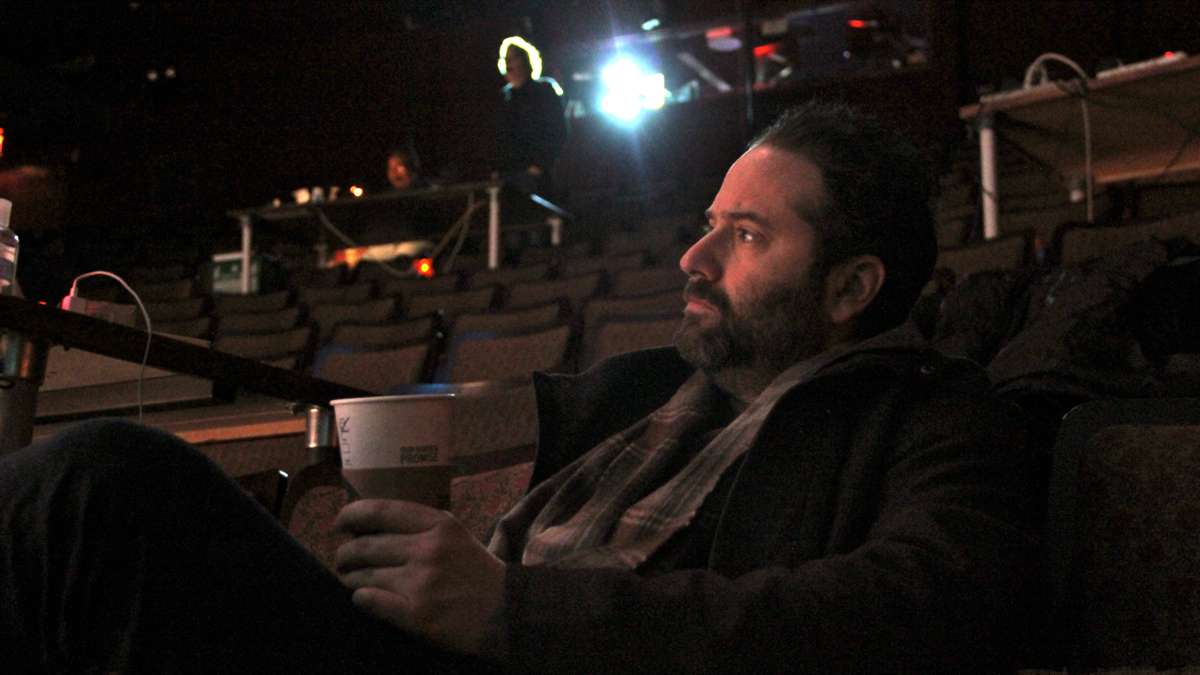Wilma’s ‘Body of an American’ frames story of haunting war photograph
ListenThe Wilma Theater in Philadelphia is now producing “The Body of an American,” a documentary-style play about war photographer Paul Watson.
“I don’t plan to see it,” said Watson in a telephone interview. “That’s no disrespect to the actors, the director, or the playwright Dan O’Brien. It goes to places I’m trying to forget. For my own mental health, it’s toxic viewing.”
Watson collaborated with O’Brien on the play, producing a script that’s mostly re-creations of their conversations. In spite of having never read the script or seen a performance, he will join O’Brien onstage at the Wilma Theater to talk with the audience.
“In the three times that I’ve been onstage with him, I can see straightaway that people are asking the kind of questions that get right at what I’m trying to talk about,” said Watson. “He’s the vessel that gets it out there.”
Watson has reported and photographed combat action in Afghanistan, Somalia, Iraq, and Pakistan. He won the Pulitzer Prize in 1994 for a photograph of civilian Somalis desecrating the body of an American soldier.
While photographing the stripped body of Staff Sgt. William David Cleveland as it was being dragged through the streets of Mogadishu by a mob of civilians, he heard a voice say to him, “If you do this, I will own you forever.”
He was, and still is, convinced it was the voice of the dead soldier.
“I’ve seen psychiatrists, who say, ‘Of course, it’s you speaking to yourself,” said Watson. “I know my inner voice. Anyone who has been through a tough university exam or a car accident has heard their inner voice. This was not me. That was such a clear experience, I have no doubt it wasn’t me speaking to myself.”
The voice turned out to be prophetic. The experience became a photo which won a Pulitzer and was the impetus to write a memoir, “Where War Lives.” The book was featured on the WHYY radio program “Fresh Air,” as Watson was interviewed by Terry Gross. That interview was heard by playwright Dan O’Brien, who immediately reached out to Watson to collaborate on a playwriting project about a haunting. The play premiered in 2012, and has since become an opera.
“Quite possibly, owning you forever isn’t a bad thing,” said Watson. “Speaking to people and getting them to understand the war within themselves — I’m not a religious person. I don’t believe in God. But I do believe in ghosts.”
An awkward collaboration
“The Body of an American” is a play about the creation of itself. Two actors play O’Brien and Watson awkwardly navigating their relationship. The playwright was determined to write a script about a haunting, while Watson wanted to package his philosophy of overcoming international conflict by first resolving personal, internal conflicts.
World peace, he believes, does not hinge on breakthroughs of diplomacy, or successfully killing off your enemies, or institutional propaganda. His message encourages individuals to curb external conflict by resolving the war within themselves
“That’s a hard thing to get across to people. It sounds like a Michael Jackson song, or something. But it isn’t,” said Watson. “It’s very practical way to approach a problem that is so big that people turn their heads away in frustration.”
Watson and O’Brien became very close, sort of: friends with boundaries. The photographer considers the playwright to be his confessor, expressing the insights and anxieties gathered from a career of witnessing the atrocities of war.
“He’s not my drinking buddy. We don’t go golfing together,” said Watson. “The relationship is based on me unloading. He’s a stranger and a friend at the same time. That’s an odd relationship.”
Theirs is a symbiotic relationship. O’Brien got a character who has spent a career physically and emotionally exposed to extremes, a character both honest and mercurial. Watson, for his part, has his story told through a medium that is likewise honest and mercurial.
“I’ve told him frequently, I’ve tried and failed to express important things as a journalist. But he’s able to take what I saw and turn it into art that touches people in a way that I can’t,” said Watson. “I want people to feel what he makes them feel, in the hope that changing the way they live is the way to start advancing things.”
During the run of “The Body of an American” in Philadelphia, Watson plans to, as usual, avoid the play. The lobby of the Wilma features Watson’s photographs taken in military hot spots around the world; he plans to avert his gaze. The audience Q&A he is scheduled to participate in on Jan. 18 will likely not be comfortable.
“Spoiler alert: certain answers to questions make me break down,” warned Watson. “I’ve done this a couple of times in connection with Dan’s work. I lose it onstage. If people remain calm — it usually takes me a couple minutes to get through it. As painful as it is, I do it because people need to talk about it.”
WHYY is your source for fact-based, in-depth journalism and information. As a nonprofit organization, we rely on financial support from readers like you. Please give today.








